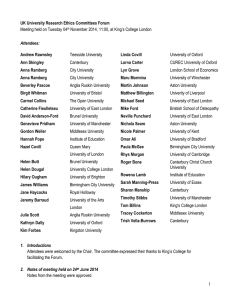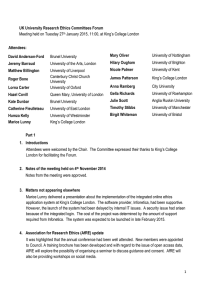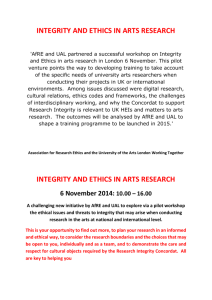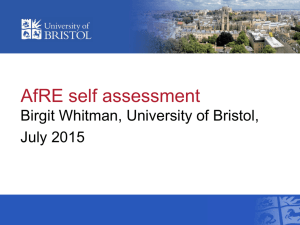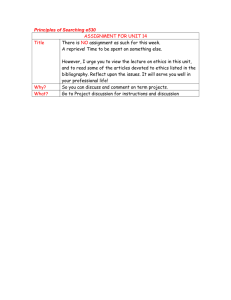Meeting Summary 28th January 2014
advertisement
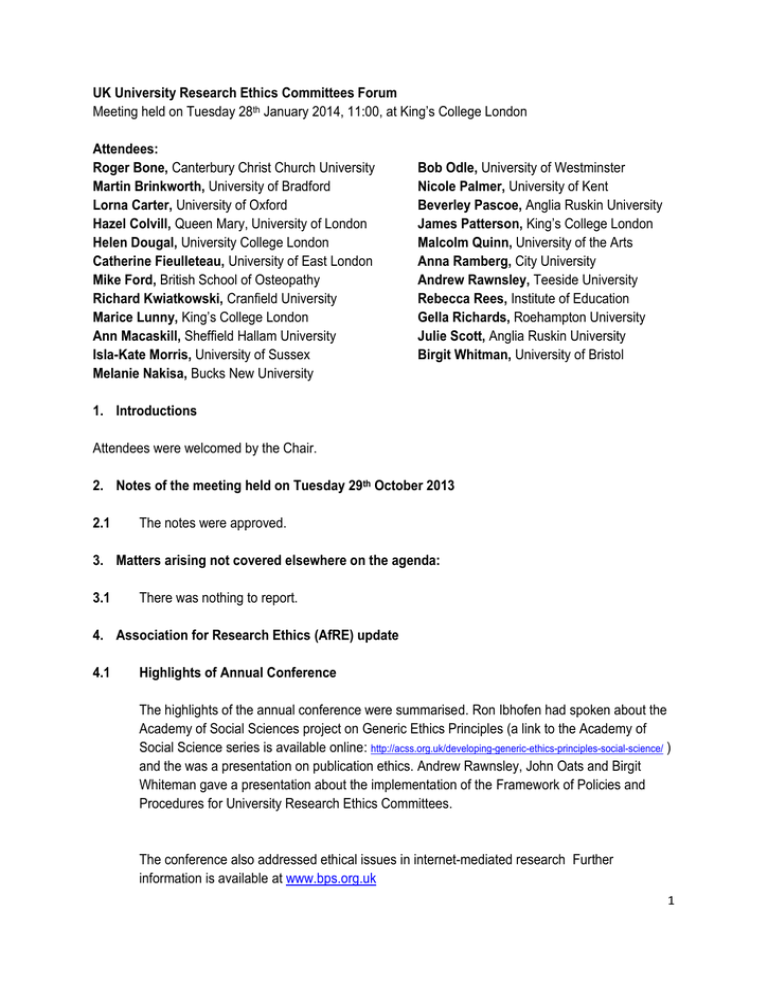
UK University Research Ethics Committees Forum Meeting held on Tuesday 28th January 2014, 11:00, at King’s College London Attendees: Roger Bone, Canterbury Christ Church University Martin Brinkworth, University of Bradford Lorna Carter, University of Oxford Hazel Colvill, Queen Mary, University of London Helen Dougal, University College London Catherine Fieulleteau, University of East London Mike Ford, British School of Osteopathy Richard Kwiatkowski, Cranfield University Marice Lunny, King’s College London Ann Macaskill, Sheffield Hallam University Isla-Kate Morris, University of Sussex Melanie Nakisa, Bucks New University Bob Odle, University of Westminster Nicole Palmer, University of Kent Beverley Pascoe, Anglia Ruskin University James Patterson, King’s College London Malcolm Quinn, University of the Arts Anna Ramberg, City University Andrew Rawnsley, Teeside University Rebecca Rees, Institute of Education Gella Richards, Roehampton University Julie Scott, Anglia Ruskin University Birgit Whitman, University of Bristol 1. Introductions Attendees were welcomed by the Chair. 2. Notes of the meeting held on Tuesday 29th October 2013 2.1 The notes were approved. 3. Matters arising not covered elsewhere on the agenda: 3.1 There was nothing to report. 4. Association for Research Ethics (AfRE) update 4.1 Highlights of Annual Conference The highlights of the annual conference were summarised. Ron Ibhofen had spoken about the Academy of Social Sciences project on Generic Ethics Principles (a link to the Academy of Social Science series is available online: http://acss.org.uk/developing-generic-ethics-principles-social-science/ ) and the was a presentation on publication ethics. Andrew Rawnsley, John Oats and Birgit Whiteman gave a presentation about the implementation of the Framework of Policies and Procedures for University Research Ethics Committees. The conference also addressed ethical issues in internet-mediated research Further information is available at www.bps.org.uk 1 4.2 Update on the Framework of Policies and Procedures for University RECs The Development Group has discussed the possibility of training for AfRE members. Forum attendees were invited to suggest ideas for a training programme (see Appendix 1) and these will be made available to the Development Group. The Framework has been made available to relevant colleagues working on the EU ethics requirements and the Framework is currently taking into consideration for the development of European research ethics standards. 4.3 HRA/AfRE workshops Currently workshops for supervisors are underway. The final round of this year’s workshops will focus on Sponsorship. Forum Attendees highlighted the need for feed-back from AfRE to those institutions who had hosted a workshop. 5. Watching briefs: 5.1 Human Tissue Act Nothing was identified 5.2 Concordat to support research integrity activities A Russell Group working group has been set up. Workshops are expected to cover training needs and the handling of research misconduct in relation to the Concordat. The group is also working with funders of research to establish further clarification about the auditing component. 5.3 EU Data Protection Regulation The European Union (EU) is considering the introduction of new data-protection regulation. This might prove restrictive to academic researchers. The ESRC have published a joint statement on EU Data Protection Regulation http://www.esrc.ac.uk/news-and-events/announcements/29772/Joint_statement_on_EU_Data_Protection_Regulation.aspx 5.4 What has been the major issue in your institution since the last meeting? Forum members reported issues such as the recruitment of lay members. One particular issue arising from this is background checks for putative REC members. 2 6. Dates of future meetings 11am on Tuesday 24th June 2014 at King’s College London 7. Any Other Business None. 8. Part 2 discussion session: Training for members of UERCs - What training is currently available in your institution? - Training needs analysis with a view of feeding results to AfRE To find out more information about: UK URECs Forum please email rec@kcl.ac.uk. Association for Research Ethics (AfRE) http://www.arec.org.uk/index.asp?pageid=525597 enquiries, please email jackiemaull@arec.org.uk It would be helpful if any changes in University REC contact information could be sent to all. All minutes, presentations (with permission) and meeting dates are published on the Forum webpages hosted by King’s College London: http://www.kcl.ac.uk/research/ethics/training/ukurecforum.html 3 Appendix 1: Group work feed-back: Training needs and potential AfRE support Support from AfRE for Business case development in support of research integrity training and support mapping exercises would be welcomed with the aim of recognising that the AfRE framework provides guidelines and needs to fit with institutional models Overcome blocks to development of an ethics culture in own institution: ownership, resources, budget and support from senior management AfRE workshops to highlight the link of the AfRE Framework with the Concordat to ensure that there is recognition of the AfRE framework as a “compliance / evidence section” for the Concordat as the AfRE Framework can help demonstrate quality and transparency in the institutional ethics infrastructure. AfRE should seek ways to explore a partnership with Epigeum to develop and integrate complimentary training for those areas that are not delivered by Epigeum. AfRE might want to consider training for specific groups within the ethics infrastructure of institutions such as lay/independent member training and training for Chairs. It might be helpful to have some guidance about recruitment such as due diligence checks for lay members. AfRE might offer a selection of case studies especially to include non UK and multi-site research AfREC might develop models in which to support gender, age and ethnic diversity AfRE might offer input for the Code of practice / policy review at institutional level when relevant research ethics and integrity policies need reviewing AfRE needs to explore the applicability of the framework – to non-human research areas such as animal and non-human non animal research such as environment ethics 4
